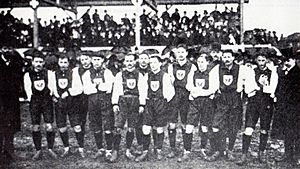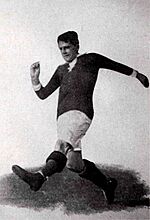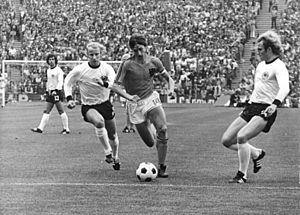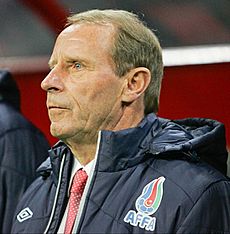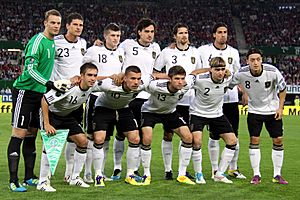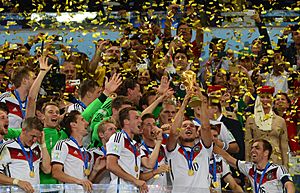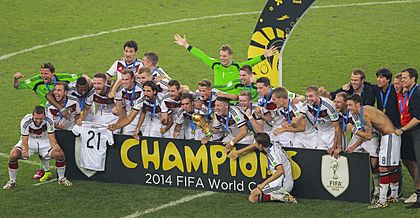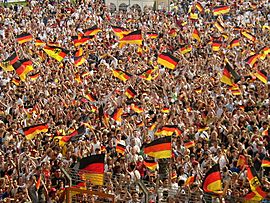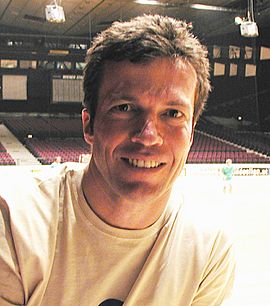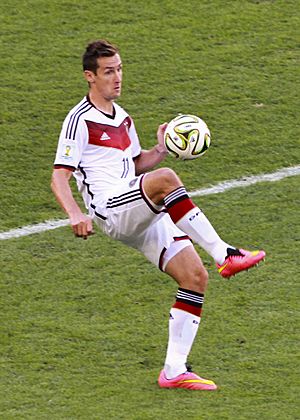Germany national football team facts for kids
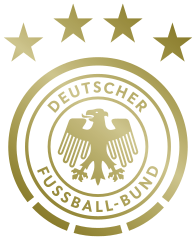 |
||||||||||||||||||||||||||||||||||||||||||||||||||||||||||||||||||||||||||||||||
| Nickname(s) | DFB-Team (DFB Team) Die Nationalelf (The National Eleven) DFB-Elf (DFB Eleven) Die Mannschaft (The Team) |
|||||||||||||||||||||||||||||||||||||||||||||||||||||||||||||||||||||||||||||||
|---|---|---|---|---|---|---|---|---|---|---|---|---|---|---|---|---|---|---|---|---|---|---|---|---|---|---|---|---|---|---|---|---|---|---|---|---|---|---|---|---|---|---|---|---|---|---|---|---|---|---|---|---|---|---|---|---|---|---|---|---|---|---|---|---|---|---|---|---|---|---|---|---|---|---|---|---|---|---|---|---|
| Association | Deutscher Fußball-Bund (DFB) | |||||||||||||||||||||||||||||||||||||||||||||||||||||||||||||||||||||||||||||||
| Confederation | UEFA (Europe) | |||||||||||||||||||||||||||||||||||||||||||||||||||||||||||||||||||||||||||||||
| Head coach | Julian Nagelsmann | |||||||||||||||||||||||||||||||||||||||||||||||||||||||||||||||||||||||||||||||
| Captain | Joshua Kimmich | |||||||||||||||||||||||||||||||||||||||||||||||||||||||||||||||||||||||||||||||
| Most caps | Lothar Matthäus (150) | |||||||||||||||||||||||||||||||||||||||||||||||||||||||||||||||||||||||||||||||
| Top scorer | Miroslav Klose (71) | |||||||||||||||||||||||||||||||||||||||||||||||||||||||||||||||||||||||||||||||
| Home stadium | Various | |||||||||||||||||||||||||||||||||||||||||||||||||||||||||||||||||||||||||||||||
| FIFA code | GER | |||||||||||||||||||||||||||||||||||||||||||||||||||||||||||||||||||||||||||||||
|
||||||||||||||||||||||||||||||||||||||||||||||||||||||||||||||||||||||||||||||||
| FIFA ranking | ||||||||||||||||||||||||||||||||||||||||||||||||||||||||||||||||||||||||||||||||
| Current | 16 |
|||||||||||||||||||||||||||||||||||||||||||||||||||||||||||||||||||||||||||||||
| Highest | 1 (December 1992 – August 1993, December 1993 – March 1994, June 1994, July 2014 – June 2015, July 2017, September 2017 – June 2018) | |||||||||||||||||||||||||||||||||||||||||||||||||||||||||||||||||||||||||||||||
| Lowest | 22 (March 2006) | |||||||||||||||||||||||||||||||||||||||||||||||||||||||||||||||||||||||||||||||
| Elo ranking | ||||||||||||||||||||||||||||||||||||||||||||||||||||||||||||||||||||||||||||||||
| Current | 9 |
|||||||||||||||||||||||||||||||||||||||||||||||||||||||||||||||||||||||||||||||
| Highest | 1 (1990–92, 1993–94, 1996–97, July 2014 – May 2016, October 2017 – November 2017) | |||||||||||||||||||||||||||||||||||||||||||||||||||||||||||||||||||||||||||||||
| Lowest | 24 (September 1924 – October 1925) | |||||||||||||||||||||||||||||||||||||||||||||||||||||||||||||||||||||||||||||||
| First international | ||||||||||||||||||||||||||||||||||||||||||||||||||||||||||||||||||||||||||||||||
(Basel, Switzerland; 5 April 1908) |
||||||||||||||||||||||||||||||||||||||||||||||||||||||||||||||||||||||||||||||||
| Biggest win | ||||||||||||||||||||||||||||||||||||||||||||||||||||||||||||||||||||||||||||||||
(Stockholm, Sweden; 1 July 1912) |
||||||||||||||||||||||||||||||||||||||||||||||||||||||||||||||||||||||||||||||||
| Biggest defeat | ||||||||||||||||||||||||||||||||||||||||||||||||||||||||||||||||||||||||||||||||
(Oxford, England; 13 March 1909) |
||||||||||||||||||||||||||||||||||||||||||||||||||||||||||||||||||||||||||||||||
| World Cup | ||||||||||||||||||||||||||||||||||||||||||||||||||||||||||||||||||||||||||||||||
| Appearances | 20 (first in 1934) | |||||||||||||||||||||||||||||||||||||||||||||||||||||||||||||||||||||||||||||||
| Best result | Champions (1954, 1974, 1990, 2014) | |||||||||||||||||||||||||||||||||||||||||||||||||||||||||||||||||||||||||||||||
| European Championship | ||||||||||||||||||||||||||||||||||||||||||||||||||||||||||||||||||||||||||||||||
| Appearances | 14 (first in 1972) | |||||||||||||||||||||||||||||||||||||||||||||||||||||||||||||||||||||||||||||||
| Best result | Champions (1972, 1980, 1996) | |||||||||||||||||||||||||||||||||||||||||||||||||||||||||||||||||||||||||||||||
| Nations League Finals | ||||||||||||||||||||||||||||||||||||||||||||||||||||||||||||||||||||||||||||||||
| Appearances | 1 (first in 2025) | |||||||||||||||||||||||||||||||||||||||||||||||||||||||||||||||||||||||||||||||
| Best result | Fourth place (2025) | |||||||||||||||||||||||||||||||||||||||||||||||||||||||||||||||||||||||||||||||
| Summer Olympic Games | ||||||||||||||||||||||||||||||||||||||||||||||||||||||||||||||||||||||||||||||||
| Appearances | 8 (first in 1912) | |||||||||||||||||||||||||||||||||||||||||||||||||||||||||||||||||||||||||||||||
| Best result | ||||||||||||||||||||||||||||||||||||||||||||||||||||||||||||||||||||||||||||||||
| Confederations Cup | ||||||||||||||||||||||||||||||||||||||||||||||||||||||||||||||||||||||||||||||||
| Appearances | 3 (first in 1999) | |||||||||||||||||||||||||||||||||||||||||||||||||||||||||||||||||||||||||||||||
| Best result | Champions (2017) | |||||||||||||||||||||||||||||||||||||||||||||||||||||||||||||||||||||||||||||||
|
Medal record
|
||||||||||||||||||||||||||||||||||||||||||||||||||||||||||||||||||||||||||||||||
The Germany national football team is a famous soccer team that plays for Germany. They played their very first game in 1908. The team is managed by the German Football Association (DFB). This group was started in 1900. For a long time, from 1949 to 1990, Germany was split into different parts. Because of this, there were separate German football teams. These included West Germany, Saarland, and East Germany. After Germany became one country again in 1990, these teams joined together. The current team represents the united Germany.
Germany is one of the most successful football teams in the world. They have won the FIFA World Cup four times: in 1954, 1974, 1990, and 2014. This means they are tied with Italy for second most wins. Only Brazil has won more World Cups. Germany has also won the UEFA European Championship three times (in 1972, 1980, and 1996). They are second only to Spain in this competition. In 2017, Germany also won the FIFA Confederations Cup. They have been runners-up many times in both the World Cup and European Championship. East Germany also won an Olympic Gold medal in football in 1976. Germany is special because it's one of only two countries to win both the men's and women's World Cups.
Contents
- The History of German Football
- Early Days (1899–1942)
- Germany's Teams After World War II (1945–1990)
- Winning the 1954 World Cup
- Famous Matches and Close Calls (1958–1970)
- Winning the World Cup at Home in 1974
- Success in the Late 1970s and Early 1980s
- Beckenbauer's Coaching Triumphs (1984–1990)
- Olympic Football Achievements
- The Berti Vogts Era (1990–1998)
- New Coaches: Ribbeck and Völler (2000–2004)
- A Strong Comeback with Klinsmann (2004–2006)
- The Löw Era: World Cup Glory and Challenges (2006–2021)
- The Team Today (2021–Present)
- What Makes the Team Special
- Game Results and Upcoming Matches
- The Coaching Team
- Meet the Players
- Player Achievements
- Team Achievements
- Germany's Tournament History
- Awards and Trophies
- See also
The History of German Football
Early Days (1899–1942)
Before a national team was officially formed, some international games were played in Germany. The first official match for the Germany national football team happened on April 5, 1908. They played against Switzerland in Basel, and Switzerland won 5–3.
Early games against England were tough. In March 1909, Germany had its biggest official loss, 9–0, against England's amateur team. These early matches started a long and exciting rivalry between the two teams.
Julius Hirsch was the first Jewish player to play for the Germany national team. He joined in 1911. In 1912, Hirsch scored four goals against the Netherlands. This made him the first German to score so many goals in one game.
Gottfried Fuchs set a world record by scoring 10 goals for Germany in a 16–0 win against Russia. This happened at the 1912 Olympics in Stockholm. He was the top scorer of that tournament. Fuchs was also Jewish, and sadly, references to him were removed from German football records for a time.
At first, players were chosen by the DFB, as there was no main coach. The first manager was Otto Nerz, who coached from 1926 to 1936. Germany could not travel to Uruguay for the first World Cup in 1930 because of money problems. But they finished third in the 1934 World Cup, which was their first time in the competition.
After the 1936 Olympic Games, Sepp Herberger became the coach. In 1937, he put together a strong team called the Breslau Elf. They got this name after winning 8–0 against Denmark in the city of Breslau.
After Austria joined Germany in 1938, the strong Austrian national team was combined with the German team. This was done for political reasons. At the 1938 World Cup in France, this combined team did not do well. They drew one game and then lost another. This early exit was Germany's worst World Cup result for a long time.
During World War II, the team played many games. But then, international matches were stopped because most players had to join the armed forces. Coach Herberger tried to keep the players safe during this time.
Germany's Teams After World War II (1945–1990)
After World War II, Germany was not allowed to play in many sports until 1950. Germany was divided into different parts: West Germany, East Germany, and Saarland. Each part had its own football team for a while.
West Germany continued the DFB and kept the records of the older German team. They played their first game in 1950 against Switzerland. West Germany then qualified for the 1954 World Cup.
The Saarland region also had its own team for a few years. They even played in the 1952 Olympics and World Cup qualifiers. In 1957, Saarland joined West Germany.
East Germany formed its own football team in 1952. This team famously beat West Germany in the 1974 World Cup. East Germany also won an Olympic gold medal in 1976. When Germany became one country again in 1990, all these football teams reunited under the DFB.
Winning the 1954 World Cup
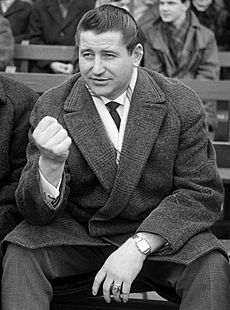
In the 1954 FIFA World Cup, West Germany, led by captain Fritz Walter, faced strong teams. They played against the powerful Hungarian team, known as the "Mighty Magyars," twice. Hungary had not lost a game in 32 matches.
In the final, West Germany beat Hungary 3–2. Helmut Rahn scored the winning goal. This amazing victory is known as "The Miracle of Bern."
Famous Matches and Close Calls (1958–1970)
After finishing fourth in the 1958 World Cup and reaching the quarter-finals in 1962, the DFB made some changes. They started a new league called the Bundesliga. In 1964, Helmut Schön became the new coach.
In the 1966 World Cup, West Germany reached the final against host country England. In extra time, England scored a controversial goal that many still debate. England won the game 4–2.
West Germany got revenge in the 1970 World Cup by beating England 3–2 in the quarter-finals. They then had an incredible semi-final match against Italy. This game had five goals in extra time and is called the "Game of the Century" in both countries. Italy won 4–3. West Germany finished third by beating Uruguay 1–0. Gerd Müller was the top scorer with 10 goals.
Winning the World Cup at Home in 1974
In 1971, Franz Beckenbauer became the captain. He led West Germany to win the European Championship in 1972, beating the Soviet Union 3–0 in the final.
As hosts of the 1974 World Cup, they won their second World Cup title. They beat the Netherlands 2–1 in the final in Munich.
A special match in the 1974 World Cup was when West Germany played against East Germany. The East Germans won 1–0. However, West Germany still moved on to the next stage. In the final, they faced the Dutch team led by Johan Cruyff. The Netherlands scored first with a penalty. But West Germany equalized with a penalty by Paul Breitner. Then, Gerd Müller scored the winning goal.
Success in the Late 1970s and Early 1980s
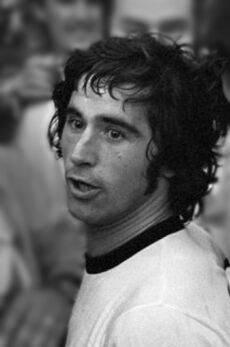
West Germany did not win the next two big tournaments. They lost to Czechoslovakia in the UEFA Euro 1976 final in a penalty shootout. This was their last penalty shootout loss in a major tournament for a long time.
In the 1978 World Cup, Germany was knocked out after losing 3–2 to Austria. Coach Schön retired, and his assistant, Jupp Derwall, took over.
Under Derwall, West Germany won their second European title at Euro 1980. They beat Belgium 2–1 in the final. In the 1982 World Cup, they had a surprising 1–2 loss to Algeria in their first game. But they still made it to the next round. In the semi-final against France, they drew 3–3 and won in a penalty shootout. However, they lost the final 3–1 to Italy.
During this time, Gerd Müller scored 14 goals in two World Cups (1970 and 1974). His 10 goals in 1970 are the third-most ever in one tournament. His record of 14 World Cup goals was later broken by Ronaldo in 2006, and then by Miroslav Klose in 2014 with 16 goals.
Beckenbauer's Coaching Triumphs (1984–1990)
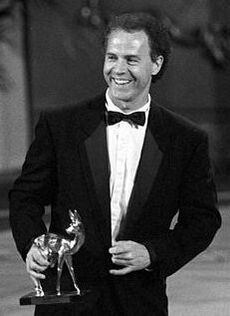
After West Germany was eliminated early from Euro 1984, Franz Beckenbauer became the manager. At the 1986 World Cup in Mexico, West Germany reached the final again. They beat France 2–0 in the semi-finals. But they lost 3–2 to Diego Maradona's Argentina in the final.
In Euro 1988, West Germany hoped to win on home soil. They played well in the group stage. But the Netherlands beat them 2–1 in the semi-finals.
At the 1990 World Cup in Italy, West Germany won their third World Cup title. This was their third final in a row! Led by captain Lothar Matthäus, they beat many strong teams. They won 1–0 against Argentina in the final, with a penalty goal from Andreas Brehme. Beckenbauer became the first person to win the World Cup as both a captain and a manager.
Olympic Football Achievements
| Medal record | ||
|---|---|---|
| Summer Olympic Games | ||
| Gold | 1976 Montreal | Team |
| Silver | 1980 Moscow | Team |
| Bronze | 1964 Tokyo | Team |
| Bronze | 1972 Munich | Team |
| Bronze | 1988 Seoul | Team |
East Germany had more success in Olympic football than West Germany. This was because Olympic football used to be for amateur players. East Germany could use its best players, who were considered amateurs by the rules.
In 1964, a united German team, which included East German players, won a bronze medal. As East Germany, they won bronze in 1972, gold in 1976, and silver in 1980. West Germany won a bronze medal in 1988.
The Berti Vogts Era (1990–1998)
After the Berlin Wall fell, East Germany and West Germany were grouped together for the Euro 1992 qualifiers. In November 1990, the East German football association joined the DFB. The unified Germany national team then finished the qualifying group. The first game for the unified team was against Switzerland on December 19, 1990.
After the 1990 World Cup, assistant coach Berti Vogts took over from Beckenbauer. In Euro 1992, Germany reached the final but lost 0–2 to Denmark. In the 1994 World Cup, they were upset 1–2 by Bulgaria in the quarter-finals.
Unified Germany won its first major title at Euro 1996. They became European champions for the third time. They beat hosts England in the semi-finals. Then they defeated the Czech Republic 2–1 in the final with a "golden goal" in extra time.
However, in the 1998 World Cup, Germany was knocked out in the quarter-finals. They lost 0–3 to Croatia. Vogts then stepped down and Erich Ribbeck became the new coach.
New Coaches: Ribbeck and Völler (2000–2004)
In Euro 2000, the team did not make it past the first round. They drew one game and lost two. Ribbeck resigned, and Rudi Völler took his place.
Before the 2002 World Cup, many people did not expect Germany to do well. But the team surprised everyone. They won three games in a row by a score of 1–0 in the knockout stages. This led them to the final against Brazil. It was the first time these two teams met in a World Cup final. Germany lost 0–2. However, German captain and goalkeeper Oliver Kahn won the Golden Ball award. This meant he was named the best player of the tournament.
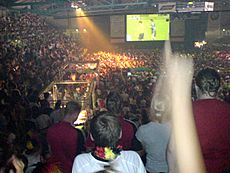
Germany again exited in the first round at Euro 2004. Völler resigned after this, and Jürgen Klinsmann became the head coach.
A Strong Comeback with Klinsmann (2004–2006)
Klinsmann's main goal was to lead the team to a good performance at the 2006 World Cup in Germany. He made some big changes, including choosing Jens Lehmann as the starting goalkeeper over Oliver Kahn. Many people had low expectations for the team.
As the host nation, Germany won all three of their group stage matches. They beat Sweden 2–0 in the round of 16. Then they defeated Argentina in the quarter-finals in a penalty shootout. In the semi-final, they lost to Italy after extra time. In the third-place match, Germany beat Portugal 3–1. Miroslav Klose won the Golden Boot award for scoring five goals.
The Löw Era: World Cup Glory and Challenges (2006–2021)
European and World Cup Journeys (2008–2012)
Joachim Löw became Germany's coach after Klinsmann resigned. At UEFA Euro 2008, Germany reached the final but lost 1–0 to Spain.
At the 2010 World Cup, Germany won their group. They beat England 4–1 in the round of 16. Miroslav Klose tied Gerd Müller's record of 14 World Cup goals as Germany defeated Argentina 4–0 in the quarter-finals. In the semi-finals, Germany lost 1–0 to Spain. They finished third by beating Uruguay 3–2. Thomas Müller won the Golden Boot and the Best Young Player Award.
At Euro 2012, Germany won all three of their group matches. They then beat Greece in the quarter-finals, setting a record of 15 wins in a row in competitive matches. However, they lost 2–1 to Italy in the semi-finals.
The Unforgettable 2014 World Cup Win
Germany was in Group G for the 2014 FIFA World Cup. They started by beating Portugal 4–0, with Thomas Müller scoring three goals. In their game against Ghana, Miroslav Klose scored his 15th World Cup goal. This tied him with Brazil's Ronaldo as the top World Cup scorer. Germany then beat the United States 1–0 to move to the knockout stages.
In the round of 16, Germany beat Algeria 2–1 in extra time. Mats Hummels scored the only goal in the quarter-finals against France, sending Germany to their fourth semi-final in a row.
The semi-final against Brazil was one of the most amazing games in World Cup history. Germany scored four goals in less than seven minutes! They were up 5–0 by the 30th minute. Germany won 7–1, which was Brazil's worst World Cup defeat ever. Germany also broke several World Cup records in this game.
The World Cup final was held in Rio de Janeiro on July 13. Mario Götze scored a goal in the 113th minute. This helped Germany beat Argentina 1–0. They became the first European team to win a FIFA World Cup in the Americas.
European Championship and Confederations Cup (2016–2017)
After the 2014 World Cup, some key players retired. The team had a slow start in the Euro 2016 qualifiers. They eventually won their group and qualified for the tournament.
In November 2015, Germany was in Paris for a friendly game against France. Due to safety concerns in the city, the team stayed inside the stadium overnight. A few days later, another friendly game in Hanover against the Netherlands was cancelled shortly before it began, also due to security reasons.
At UEFA Euro 2016, Germany won their group. They beat Slovakia 3–0 in the round of 16. Germany then faced their rivals Italy in the quarter-finals. The game ended 1–1 after extra time. Germany won 6–5 in a penalty shootout. This was the first time Germany had beaten Italy in a major tournament. Germany then lost 2–0 to hosts France in the semi-finals.
Germany qualified for the 2017 FIFA Confederations Cup as World Cup winners. They won the tournament by beating Chile 1–0 in the final in Russia.
Recent Challenges: World Cup and Nations League (2018–2021)
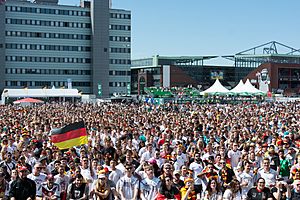
After winning all their qualifying matches and the Confederations Cup, Germany started the 2018 World Cup with a loss to Mexico. They beat Sweden 2–1 in their second game. However, they were knocked out after losing 2–0 to South Korea. This was Germany's first time exiting in the group stage since 1938.
Germany's struggles continued in the first UEFA Nations League. They drew with France and lost to the Netherlands and France again. They were almost moved to a lower league, but changes to the tournament rules saved them.
In March 2021, the DFB announced that Löw would step down as Germany's manager after UEFA Euro 2020. Later that month, Germany lost 2–1 at home to North Macedonia in the World Cup qualifiers. This was their first World Cup qualification defeat since 2001. On May 25, 2021, Hansi Flick became the new head coach.
At Euro 2020 (which was played in 2021 due to the COVID-19 pandemic), Germany was in a tough group. They lost to France but beat Portugal. Germany then lost 2–0 to England in the round of 16. This was their first time exiting at this stage in a major tournament since 1938.
The Team Today (2021–Present)
After Euro 2020, Hansi Flick took over as coach. On October 11, 2021, Germany beat North Macedonia 4–0. They became the first team to qualify for the 2022 World Cup in Qatar. In the 2022–23 Nations League, Germany had their first competitive win against Italy, beating them 5–2.

At the 2022 World Cup, Germany was in Group E. They started with a surprising 2–1 loss to Japan. Germany drew 1–1 with Spain. Despite a 4–2 win over Costa Rica, they were knocked out in the group stage for the second World Cup in a row. They missed the knockout stages by goal difference.
After several poor games, including a 4–1 home loss to Japan, Flick was dismissed on September 10, 2023. On September 22, 2023, Julian Nagelsmann was named the new head coach. After a difficult end to 2023, Germany found its form in 2024. They had wins against France and the Netherlands. This gave them hope for a successful UEFA Euro 2024 campaign.
As hosts of Euro 2024, Germany won the opening match against Scotland 5–1. Germany then beat Hungary 2–0 in their second match. This qualified them for the round of 16. After defeating Denmark in the round of 16, Germany went to the quarter-finals. There, they were defeated 2–1 after extra time by Spain.
What Makes the Team Special
Team Kits and Symbols
The German national team's home kit is usually a white shirt, black shorts, and white socks. These colors come from the old flag of Prussia. Since 1988, the home kit often includes designs from the modern German flag. For the 2014 World Cup, Germany wore white shorts instead of black. This was because of FIFA's rules about kit colors clashing.
The away shirt color has changed many times. Often, a green shirt with white shorts is used. This comes from the DFB's colors. Other colors like red, grey, and black have also been used.
Adidas AG has been the team's kit supplier for a long time, starting in 1954. This partnership is set to continue until at least 2026. In March 2024, Nike was announced as the new kit sponsor starting in 2027. This news caused a lot of discussion.
Three stars were added above the team's crest in 1996. These stars show Germany's World Cup wins in 1954, 1974, and 1990. In 2014, a fourth star was added after Germany won the World Cup for the fourth time.
Who Makes the Kits?
| Kit supplier | Period | Notes |
|---|---|---|
| 1950–1964 | Germany wore Leuzela kits during the 1954 FIFA World Cup. | |
| 1964–1971 | Germany wore Umbro kits during the 1966 and 1970 FIFA World Cups. | |
| 1971–1980 | Erima was a subsidiary of Adidas in the 1970s. | |
| 1980–2026 | First Adidas jersey was worn in the UEFA Euro 1980 final. | |
| 2027–2034 |
Kit Sponsorship Deals
| Kit supplier | Period | Contract | Notes | |
|---|---|---|---|---|
| Announcement | Duration | |||
| 1954–2026 | 20 June 2016 | 2019–2022 (4 years) | Per year: €50 million ($56.7 million) Total: €250 million ($283.5 million) |
|
| 10 September 2018 | 2023–2026 (4 years) | Undisclosed | ||
| 2027–2034 | 21 March 2024 | 2027–2034 (8 years) | Per year: €100 million ($108 million) | |
Where Germany Plays Home Games
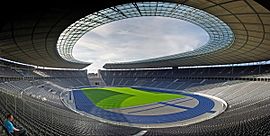
Germany plays its home matches in different stadiums all around the country. They have played in 43 different cities so far. This includes places that were part of Germany at the time, like Vienna, Austria.
Matches are held most often in Berlin (46 matches). Berlin was also the place of Germany's first home match in 1908. Other common host cities are Hamburg (34 matches), Stuttgart (32), Hanover (28), and Dortmund. Munich has also hosted important games, including the 1974 World Cup final.
Watching the Games on TV
As of July 2025, you can watch Germany's friendly games on different TV channels like RTL, ARD, and ZDF. Games for the UEFA Euro and FIFA World Cup qualifiers, UEFA Nations League, and big tournaments are shown on ARD and ZDF.
Game Results and Upcoming Matches
Here are the results of matches from the last year, and any games scheduled for the future.
Win Draw Loss Fixture
Matches Played in 2024
| 7 September 2024 2024–25 UEFA Nations League A Group 3 | Germany |
5–0 | Düsseldorf | |
| 20:45 CEST (UTC+02:00) | Stadium: Merkur Spiel-Arena Attendance: 49,235 Referee: Clément Turpin (France) |
| 10 September 2024 2024–25 UEFA Nations League A Group 3 | Netherlands |
2–2 | Amsterdam | |
| 20:45 CEST (UTC+02:00) |
|
Stadium: Johan Cruyff Arena Attendance: 50,109 Referee: Davide Massa (Italy) |
| 11 October 2024 2024–25 UEFA Nations League A Group 3 | Bosnia and Herzegovina |
1–2 | Zenica | |
| 20:45 CEST (UTC+02:00) |
|
Stadium: Bilino Polje Stadium Attendance: 11,000 Referee: François Letexier (France) |
| 14 October 2024 2024–25 UEFA Nations League A Group 3 | Germany |
1–0 | Munich | |
| 20:45 CEST (UTC+02:00) | Stadium: Allianz Arena Attendance: 68,367 Referee: Slavko Vinčić (Slovenia) |
| 16 November 2024 2024–25 UEFA Nations League A Group 3 | Germany |
7–0 | Freiburg | |
| 20:45 CET (UTC+01:00) | Stadium: Europa-Park Stadion Attendance: 28,143 Referee: Vassilis Fotias (Greece) |
| 19 November 2024 2024–25 UEFA Nations League A Group 3 | Hungary |
1–1 | Budapest | |
| 20:45 CET (UTC+01:00) |
|
Stadium: Puskás Aréna Attendance: 53,212 Referee: Duje Strukan (Croatia) |
Matches Played and Upcoming in 2025
| 20 March 2025 2024–25 UEFA Nations League QF | Italy |
1–2 | Milan | |
| 20:45 CET (UTC+01:00) |
|
Stadium: San Siro Attendance: 60,334 Referee: François Letexier (France) |
| 23 March 2025 2024–25 UEFA Nations League QF | Germany |
3–3 (5–4 agg.) |
Dortmund | |
| 20:45 CET (UTC+01:00) | Stadium: Westfalenstadion Attendance: 64,762 Referee: Szymon Marciniak (Poland) |
| 4 June 2025 2025 UEFA Nations League SF | Germany |
1–2 | Munich | |
| 21:00 CEST (UTC+02:00) |
|
Stadium: Allianz Arena Attendance: 65,823 Referee: Slavko Vinčić (Slovenia) |
| 8 June 2025 2025 UEFA Nations League 3rd | Germany |
0–2 | Stuttgart | |
| 15:00 CEST (UTC+02:00) |
|
Stadium: MHPArena Attendance: 51,313 Referee: Ivan Kružliak (Slovakia) |
| 4 September 2025 2026 World Cup Q | Slovakia |
v | Bratislava | |
| 20:45 CEST (UTC+02:00) | Stadium: Tehelné pole |
| 7 September 2025 2026 World Cup Q | Germany |
v | Cologne | |
| 20:45 CEST (UTC+02:00) | Stadium: RheinEnergieStadion |
| 10 October 2025 2026 World Cup Q | Germany |
v | Sinsheim | |
| 20:45 CEST (UTC+02:00) | Stadium: PreZero Arena |
| 13 October 2025 2026 World Cup Q | Northern Ireland |
v | Belfast | |
| 20:45 CEST (UTC+02:00) | Stadium: Windsor Park |
| 14 November 2025 2026 World Cup Q | Luxembourg |
v | Luxembourg City | |
| 20:45 CET (UTC+01:00) | Stadium: Stade de Luxembourg |
| 17 November 2025 2026 World Cup Q | Germany |
v | Leipzig | |
| 20:45 CET (UTC+01:00) | Stadium: Red Bull Arena |
The Coaching Team
- As of March 2024.
| Position | Name |
|---|---|
| Head coach | |
| Assistant coaches | |
| Goalkeeping coaches | |
| Fitness coach | |
| Athletic coach | |
| Doctor | |
| Sporting director |
Meet the Players
Players on the Current Team
The following players were called up for the 2025 UEFA Nations League Finals.
- Information correct as of 8 June 2025.
| No. | Pos. | Player | Date of birth (age) | Caps | Goals | Club |
|---|---|---|---|---|---|---|
| 1 | GK | Marc-André ter Stegen | 30 April 1992 | 44 | 0 | |
| 12 | GK | Oliver Baumann | 2 June 1990 | 4 | 0 | |
| 24 | GK | Alexander Nübel | 30 September 1996 | 2 | 0 | |
|
|
||||||
| 2 | DF | Waldemar Anton | 20 July 1996 | 8 | 0 | |
| 3 | DF | Robin Koch | 17 July 1996 | 14 | 0 | |
| 4 | DF | Jonathan Tah | 11 February 1996 | 37 | 0 | |
| 6 | DF | Joshua Kimmich (captain) | 8 February 1995 | 101 | 8 | |
| 15 | DF | Thilo Kehrer | 21 September 1996 | 28 | 0 | |
| 18 | DF | Maximilian Mittelstädt | 18 March 1997 | 14 | 1 | |
| 22 | DF | David Raum | 22 April 1998 | 28 | 0 | |
| 23 | DF | Robert Andrich | 22 September 1994 | 18 | 0 | |
|
|
||||||
| 5 | MF | Pascal Groß | 15 June 1991 | 15 | 1 | |
| 7 | MF | Felix Nmecha | 10 October 2000 | 4 | 1 | |
| 8 | MF | Leon Goretzka | 6 February 1995 | 61 | 15 | |
| 14 | MF | Karim Adeyemi | 18 January 2002 | 8 | 1 | |
| 17 | MF | Florian Wirtz | 3 May 2003 | 31 | 7 | |
| 19 | MF | Leroy Sané | 11 January 1996 | 70 | 14 | |
| 20 | MF | Serge Gnabry | 14 July 1995 | 51 | 22 | |
| 21 | MF | Robin Gosens | 5 July 1994 | 24 | 2 | |
| 25 | MF | Aleksandar Pavlović | 3 May 2004 | 5 | 1 | |
| 26 | MF | Tom Bischof | 28 June 2005 | 1 | 0 | |
|
|
||||||
| 9 | FW | Niclas Füllkrug | 9 February 1993 | 24 | 14 | |
| 11 | FW | Nick Woltemade | 14 February 2002 | 2 | 0 | |
| 13 | FW | Deniz Undav | 19 July 1996 | 6 | 3 | |
Other Players Who Have Played Recently
The following players have also been called up for the team within the last twelve months.
| Pos. | Player | Date of birth (age) | Caps | Goals | Club | Latest call-up |
|---|---|---|---|---|---|---|
| GK | Stefan Ortega | 6 November 1992 | 0 | 0 | v. |
|
| GK | Janis Blaswich | 2 May 1991 | 0 | 0 | v. |
|
|
|
||||||
| DF | Yann Aurel Bisseck | 29 November 2000 | 1 | 0 | 2025 UEFA Nations League Finals INJ | |
| DF | Antonio Rüdiger | 3 March 1993 | 79 | 3 | v. |
|
| DF | Benjamin Henrichs | 23 February 1997 | 19 | 0 | v. |
|
| DF | Nico Schlotterbeck | 1 December 1999 | 20 | 0 | v. |
|
|
|
||||||
| MF | Nadiem Amiri | 27 October 1996 | 7 | 0 | 2025 UEFA Nations League Finals INJ | |
| MF | Angelo Stiller | 4 April 2001 | 4 | 0 | 2025 UEFA Nations League Finals INJ | |
| MF | Jamal Musiala | 26 February 2003 | 40 | 8 | v. |
|
| MF | Jamie Leweling | 26 February 2001 | 2 | 1 | v. |
|
| MF | Julian Brandt | 2 May 1996 | 48 | 3 | v. |
|
| MF | Chris Führich | 9 January 1998 | 8 | 0 | v. |
|
| MF | Kevin Schade | 27 November 2001 | 4 | 0 | v. |
|
| MF | Emre Can | 12 January 1994 | 48 | 2 | v. |
|
|
|
||||||
| FW | Jonathan Burkardt | 11 July 2000 | 3 | 0 | 2025 UEFA Nations League Finals INJ | |
| FW | Tim Kleindienst | 31 August 1995 | 6 | 4 | v. |
|
| FW | Kai Havertz | 11 June 1999 | 55 | 20 | v. |
|
| FW | Maximilian Beier | 17 October 2002 | 4 | 0 | v. |
|
|
||||||
Player Achievements
Top Players and Their Records
- Players in bold are still active with Germany.
- This list does not include players who represented East Germany.
Players with the Most Games Played
| Rank | Player | Caps | Goals | Period |
|---|---|---|---|---|
| 1 | Lothar Matthäus | 150 | 23 | 1980–2000 |
| 2 | Miroslav Klose | 137 | 71 | 2001–2014 |
| 3 | Thomas Müller | 131 | 45 | 2010–2024 |
| 4 | Lukas Podolski | 130 | 49 | 2004–2017 |
| 5 | Manuel Neuer | 124 | 0 | 2009–2024 |
| 6 | Bastian Schweinsteiger | 121 | 24 | 2004–2016 |
| 7 | Toni Kroos | 114 | 17 | 2010–2024 |
| 8 | Philipp Lahm | 113 | 5 | 2004–2014 |
| 9 | Jürgen Klinsmann | 108 | 47 | 1987–1998 |
| 10 | Jürgen Kohler | 105 | 2 | 1986–1998 |
Players Who Scored the Most Goals
| Rank | Player | Goals | Caps | Average | Period |
|---|---|---|---|---|---|
| 1 | Miroslav Klose (list) | 71 | 137 | 0.52 | 2001–2014 |
| 2 | Gerd Müller (list) | 68 | 62 | 1.1 | 1966–1974 |
| 3 | Lukas Podolski | 49 | 130 | 0.38 | 2004–2017 |
| 4 | Rudi Völler | 47 | 90 | 0.52 | 1982–1994 |
| Jürgen Klinsmann | 108 | 0.44 | 1987–1998 | ||
| 6 | Karl-Heinz Rummenigge | 45 | 95 | 0.47 | 1976–1986 |
| Thomas Müller | 131 | 0.34 | 2010–2024 | ||
| 8 | Uwe Seeler | 43 | 72 | 0.6 | 1954–1970 |
| 9 | Michael Ballack | 42 | 98 | 0.43 | 1999–2010 |
| 10 | Oliver Bierhoff | 37 | 70 | 0.53 | 1996–2002 |
Team Captains Through the Years
| Player | Period | Notes |
|---|---|---|
| Fritz Szepan | 1934–1939 | |
| Paul Janes | 1939–1942 | |
| Fritz Walter | 1951–1956 | First official captain of the West Germany national football team World Cup winning captain (1954) |
| Hans Schäfer | 1952–1962 | First West German player to play in three World Cup tournaments (1954, 1958, 1962) |
| Helmut Rahn | 1958–1959 | |
| Herbert Erhardt | 1959–1962 | |
| Hans Schäfer | 1962 | |
| Uwe Seeler | 1962–1970 | |
| Wolfgang Overath | 1970–1972 | |
| Franz Beckenbauer | 1972–1977 | European Championship winning captain (1972) World Cup winning captain (1974) |
| Berti Vogts | 1977–1978 | |
| Sepp Maier | 1978–1979 | |
| Bernard Dietz | 1979–1981 | European Championship winning captain (1980) |
| Karl-Heinz Rummenigge | 1981–1986 | |
| Harald Schumacher | 1986 | |
| Klaus Allofs | 1986–1987 | |
| Lothar Matthäus | 1987–1995 | World Cup winning captain (1990) First captain of the unified Germany national football team |
| Jürgen Klinsmann | 1995–1998 | European Championship winning captain (1996) |
| Oliver Bierhoff | 1998–2001 | |
| Oliver Kahn | 2001–2004 | |
| Michael Ballack | 2004–2010 | |
| Philipp Lahm | 2010–2014 | World Cup winning captain (2014) |
| Bastian Schweinsteiger | 2014–2016 | |
| Manuel Neuer | 2016–2017, 2017–2023 | |
| Julian Draxler | 2017 | Confederations Cup winning captain (2017) |
| İlkay Gündoğan | 2023–2024 | |
| Joshua Kimmich | 2024– |
Germany's Player of the Year
- 2010: Bastian Schweinsteiger
- 2011: Mesut Özil
- 2012: Mesut Özil
- 2013: Mesut Özil
- 2014: Toni Kroos
- 2015: Mesut Özil
- 2016: Mesut Özil
- 2017: Joshua Kimmich
- 2018: Marco Reus
- 2019: Matthias Ginter
- 2020: Manuel Neuer
- 2021: Joshua Kimmich
- 2022: Jamal Musiala
- 2023: Emre Can
- 2024: Jamal Musiala
Coach Records
- Joachim Löw: 198
Team Achievements
A World Record: 15 Wins in a Row!
| Date | Opponent | Venue | Result | Type | Scorers | |
|---|---|---|---|---|---|---|
| 10 July 2010 | Port Elizabeth, RSA | * | 3–2 | WC 2010 3rd place | Müller |
|
| 3 September 2010 | Brussels, BEL | A | 1–0 | EC 2012 Qualification | Klose |
|
| 7 September 2010 | Köln | H | 6–1 | EC 2012 Qualification | Westermann Sadygov |
|
| 8 October 2010 | Berlin | H | 3–0 | EC 2012 Qualification | Klose |
|
| 12 October 2010 | Astana, KAZ | A | 3–0 | EC 2012 Qualification | Klose |
|
| 26 March 2011 | Kaiserslautern | H | 4–0 | EC 2012 Qualification | Klose |
|
| 3 June 2011 | Vienna, AUT | A | 2–1 | EC 2012 Qualification | Gómez |
|
| 7 June 2011 | Baku, AZE | A | 3–1 | EC 2012 Qualification | Özil |
|
| 2 September 2011 | Gelsenkirchen | H | 6–2 | EC 2012 Qualification | Klose Schürrle |
|
| 7 October 2011 | Istanbul, TUR | A | 3–1 | EC 2012 Qualification | Gómez |
|
| 11 October 2011 | Düsseldorf | H | 3–1 | EC 2012 Qualification | Özil |
|
| 9 June 2012 | Lviv, UKR | * | 1–0 | EC 2012 Group | Gómez |
|
| 13 June 2012 | Kharkiv, UKR | * | 2–1 | EC 2012 Group | Gómez |
|
| 17 June 2012 | Lviv, UKR | * | 2–1 | EC 2012 Group | Podolski |
|
| 22 June 2012 | Gdańsk, POL | * | 4–2 | EC 2012 Quarter final | Lahm |
Germany's Tournament History
- 1930–1938 as
 →
→  →
→  Germany
Germany - 1950–1990 as
 West Germany
West Germany - 1994–present as
 Germany
Germany
Champions Runners-up Third place Tournament played fully or partially on home soil
Germany has won the FIFA World Cup four times. Only Brazil has won more. Germany has also finished as runners-up four times. They have reached the semi-finals 13 times, which is more than any other team. From 1954 to 2014, Germany always made it to at least the last eight teams. They did not enter the first World Cup in 1930 for money reasons. They were also banned from the 1950 World Cup.
Germany has won the European Championship three times. Only Spain has won more. Germany has also finished as runners-up three times. They have qualified for every European Championship except for their first attempt in 1968. In most tournaments, Germany has reached at least the semi-finals.
See also East Germany and Saarland for the results of these separate Germany teams, and Austria for the team that was merged into the Germany national team from 1938 to 1945.
FIFA World Cup Performances
| FIFA World Cup finals record | Qualification record | ||||||||||||||||
|---|---|---|---|---|---|---|---|---|---|---|---|---|---|---|---|---|---|
| Year | Round | Position | Pld | W | D* | L | GF | GA | Squad | Pld | W | D | L | GF | GA | Campaign | |
| Did not enter | Did not enter | — | |||||||||||||||
| Third place | 3rd | 4 | 3 | 0 | 1 | 11 | 8 | Squad | 1 | 1 | 0 | 0 | 9 | 1 | 1934 | ||
| First round | 10th | 2 | 0 | 1 | 1 | 3 | 5 | Squad | 3 | 3 | 0 | 0 | 11 | 1 | 1938 | ||
| Banned from entering | Banned from entering | 1950 | |||||||||||||||
| Champions | 1st | 6 | 5 | 0 | 1 | 25 | 14 | Squad | 4 | 3 | 1 | 0 | 12 | 3 | 1954 | ||
| Fourth place | 4th | 6 | 2 | 2 | 2 | 12 | 14 | Squad | Qualified as defending champions | 1958 | |||||||
| Quarter-finals | 7th | 4 | 2 | 1 | 1 | 4 | 2 | Squad | 4 | 4 | 0 | 0 | 11 | 5 | 1962 | ||
| Runners-up | 2nd | 6 | 4 | 1 | 1 | 15 | 6 | Squad | 4 | 3 | 1 | 0 | 14 | 2 | 1966 | ||
| Third place | 3rd | 6 | 5 | 0 | 1 | 17 | 10 | Squad | 6 | 5 | 1 | 0 | 20 | 3 | 1970 | ||
| Champions | 1st | 7 | 6 | 0 | 1 | 13 | 4 | Squad | Qualified as hosts | 1974 | |||||||
| Second group stage | 6th | 6 | 1 | 4 | 1 | 10 | 5 | Squad | Qualified as defending champions | 1978 | |||||||
| Runners-up | 2nd | 7 | 3 | 2 | 2 | 12 | 10 | Squad | 8 | 8 | 0 | 0 | 33 | 3 | 1982 | ||
| Runners-up | 2nd | 7 | 3 | 2 | 2 | 8 | 7 | Squad | 8 | 5 | 2 | 1 | 22 | 9 | 1986 | ||
| Champions | 1st | 7 | 5 | 2 | 0 | 15 | 5 | Squad | 6 | 3 | 3 | 0 | 13 | 3 | 1990 | ||
| Quarter-finals | 5th | 5 | 3 | 1 | 1 | 9 | 7 | Squad | Qualified as defending champions | 1994 | |||||||
| 7th | 5 | 3 | 1 | 1 | 8 | 6 | Squad | 10 | 6 | 4 | 0 | 23 | 9 | 1998 | |||
| Runners-up | 2nd | 7 | 5 | 1 | 1 | 14 | 3 | Squad | 10 | 6 | 3 | 1 | 19 | 12 | 2002 | ||
| Third place | 3rd | 7 | 5 | 1 | 1 | 14 | 6 | Squad | Qualified as hosts | 2006 | |||||||
| 3rd | 7 | 5 | 0 | 2 | 16 | 5 | Squad | 10 | 8 | 2 | 0 | 26 | 5 | 2010 | |||
| Champions | 1st | 7 | 6 | 1 | 0 | 18 | 4 | Squad | 10 | 9 | 1 | 0 | 36 | 10 | 2014 | ||
| Group stage | 22nd | 3 | 1 | 0 | 2 | 2 | 4 | Squad | 10 | 10 | 0 | 0 | 43 | 4 | 2018 | ||
| 17th | 3 | 1 | 1 | 1 | 6 | 5 | Squad | 10 | 9 | 0 | 1 | 36 | 4 | 2022 | |||
| Total | 4 titles | 20/22 | 112 | 68 | 21* | 23 | 232 | 130 | 104 | 83 | 18 | 3 | 328 | 74 | Total | ||
- *Denotes draws including knockout matches decided via penalty shoot-out.
FIFA Confederations Cup Performances
| FIFA Confederations Cup record | |||||||||
|---|---|---|---|---|---|---|---|---|---|
| Year | Round | Position | Pld | W | D* | L | GF | GA | Squad |
| Did not enter | |||||||||
| Did not qualify | |||||||||
| Did not enter | |||||||||
| Group stage | 5th | 3 | 1 | 0 | 2 | 2 | 6 | Squad | |
| Did not qualify | |||||||||
| Did not enter | |||||||||
| Third place | 3rd | 5 | 3 | 1 | 1 | 15 | 11 | Squad | |
| Did not qualify | |||||||||
| Champions | 1st | 5 | 4 | 1 | 0 | 12 | 5 | Squad | |
| Total | 1 title | 3/10 | 13 | 8 | 2 | 3 | 29 | 22 | — |
UEFA European Championship Performances
| UEFA European Championship record | Qualification record | ||||||||||||||||
|---|---|---|---|---|---|---|---|---|---|---|---|---|---|---|---|---|---|
| Year | Round | Position | Pld | W | D* | L | GF | GA | Squad | Pld | W | D | L | GF | GA | Campaign | |
| Did not enter | Did not enter | ||||||||||||||||
| Did not qualify | 4 | 2 | 1 | 1 | 9 | 2 | 1968 | ||||||||||
| Champions | 1st | 2 | 2 | 0 | 0 | 5 | 1 | Squad | 8 | 5 | 3 | 0 | 13 | 3 | 1972 | ||
| Runners-up | 2nd | 2 | 1 | 1* | 0 | 6 | 4 | Squad | 8 | 4 | 4 | 0 | 17 | 5 | 1976 | ||
| Champions | 1st | 4 | 3 | 1 | 0 | 6 | 3 | Squad | 6 | 4 | 2 | 0 | 17 | 1 | 1980 | ||
| Group stage | 5th | 3 | 1 | 1 | 1 | 2 | 2 | Squad | 8 | 5 | 1 | 2 | 15 | 5 | 1984 | ||
| Semi-finals | 3rd | 4 | 2 | 1 | 1 | 6 | 3 | Squad | Qualified as hosts | ||||||||
| Runners-up | 2nd | 5 | 2 | 1 | 2 | 7 | 8 | Squad | 6 | 5 | 0 | 1 | 13 | 4 | 1992 | ||
| Champions | 1st | 6 | 4 | 2* | 0 | 10 | 3 | Squad | 10 | 8 | 1 | 1 | 27 | 10 | 1996 | ||
| Group stage | 15th | 3 | 0 | 1 | 2 | 1 | 5 | Squad | 8 | 6 | 1 | 1 | 20 | 4 | 2000 | ||
| 12th | 3 | 0 | 2 | 1 | 2 | 3 | Squad | 8 | 5 | 3 | 0 | 13 | 4 | 2004 | |||
| Runners-up | 2nd | 6 | 4 | 0 | 2 | 10 | 7 | Squad | 12 | 8 | 3 | 1 | 35 | 7 | 2008 | ||
| Semi-finals | 3rd | 5 | 4 | 0 | 1 | 10 | 6 | Squad | 10 | 10 | 0 | 0 | 34 | 7 | 2012 | ||
| 3rd | 6 | 3 | 2* | 1 | 7 | 3 | Squad | 10 | 7 | 1 | 2 | 24 | 9 | 2016 | |||
| Round of 16 | 15th | 4 | 1 | 1 | 2 | 6 | 7 | Squad | 8 | 7 | 0 | 1 | 30 | 7 | 2020 | ||
| Qualified as hosts | Qualified as hosts | ||||||||||||||||
| Total | 3 Titles | 14/17 | 53 | 27 | 13* | 13 | 78 | 55 | — | 106 | 76 | 20 | 10 | 267 | 68 | Total | |
- *Denotes draws include knockout matches decided via penalty shoot-out.
UEFA Nations League Performances
| UEFA Nations League record | |||||||||||||||||||||
|---|---|---|---|---|---|---|---|---|---|---|---|---|---|---|---|---|---|---|---|---|---|
| League phase / quarter-finals | Finals | ||||||||||||||||||||
| Season | LG | Grp | Pos | Pld | W | D | L | GF | GA | P/R | RK | Year | Pld | W | D* | L | GF | GA | Squad | Pos | |
| 2018–19 | A | 1 | 3rd | 4 | 0 | 2 | 2 | 3 | 7 | 11th | Did not qualify | ||||||||||
| 2020–21 | A | 4 | 2nd | 6 | 2 | 3 | 1 | 10 | 13 | 8th | |||||||||||
| 2022–23 | A | 3 | 3rd | 6 | 1 | 4 | 1 | 11 | 9 | 10th | |||||||||||
| 2024–25 | A | 3 | 1st | 8 | 5 | 3 | 0 | 23 | 8 | 2nd | 2 | 0 | 0 | 2 | 1 | 4 | Squad | 4th | |||
| Total | 24 | 8 | 12 | 4 | 47 | 37 | Top 4 | Total | 2 | 0 | 0 | 2 | 1 | 4 | — | ||||||
- *Denotes draws including knockout matches decided via penalty shoot-out.
Olympic Games Football History
| Summer Olympic Games record | Qualification record | ||||||||||||||||
|---|---|---|---|---|---|---|---|---|---|---|---|---|---|---|---|---|---|
| Year | Round | Position | Pld | W | D* | L | GF | GA | Squad | Pld | W | D | L | GF | GA | Campaign | |
| Did not enter | Did not enter | — | |||||||||||||||
| — | |||||||||||||||||
| — | |||||||||||||||||
| First round | 7th | 3 | 1 | 0 | 2 | 18 | 8 | Squad | Invited | — | |||||||
| Banned | Banned | — | |||||||||||||||
| — | |||||||||||||||||
| Quarter-finals | 5th | 2 | 1 | 0 | 1 | 5 | 4 | Squad | Invited | — | |||||||
| 6th | 2 | 1 | 0 | 1 | 9 | 2 | Squad | Qualified as hosts | — | ||||||||
| Banned | Banned | — | |||||||||||||||
| Fourth place | 4th | 4 | 2 | 0 | 2 | 8 | 8 | Squad | Invited | — | |||||||
| First round | 9th | 1 | 0 | 0 | 1 | 1 | 2 | Squad | Automatic qualification | 1956 | |||||||
| Did not qualify | 6 | 3 | 0 | 3 | 9 | 11 | 1960 | ||||||||||
| 2 | 1 | 0 | 1 | 2 | 4 | 1964 | |||||||||||
| 2 | 1 | 0 | 1 | 1 | 2 | 1968 | |||||||||||
| Second round | 5th | 6 | 3 | 1 | 2 | 17 | 8 | Squad | Qualified as hosts | 1972 | |||||||
| Did not qualify | 2 | 0 | 1 | 1 | 2 | 3 | 1976 | ||||||||||
| Did not enter | Did not enter | 1980 | |||||||||||||||
| Quarter-finals | 5th | 4 | 2 | 0 | 2 | 10 | 6 | Squad | 6 | 3 | 1 | 2 | 8 | 5 | 1984 | ||
| Bronze medal | 3rd | 6 | 4 | 1 | 1 | 16 | 4 | Squad | 8 | 5 | 2 | 1 | 16 | 4 | 1988 | ||
| Did not qualify | UEFA European Under-21 Championship | 1992 | |||||||||||||||
| 1996 | |||||||||||||||||
| 2000 | |||||||||||||||||
| 2004 | |||||||||||||||||
| 2008 | |||||||||||||||||
| 2012 | |||||||||||||||||
| Silver medal | 2nd | 6 | 3 | 3 | 0 | 22 | 6 | Squad | 2016 | ||||||||
| Group stage | 9th | 3 | 1 | 1 | 1 | 6 | 7 | Squad | 2020 | ||||||||
| Did not qualify | 2024 | ||||||||||||||||
| To be determined | To be determined | ||||||||||||||||
| Total | 2 medals | 10/28 | 37 | 18 | 6* | 13 | 112 | 55 | — | 26 | 13 | 4 | 9 | 38 | 29 | Total | |
- *Denotes draws including knockout matches decided via penalty shoot-out.
- **Red border indicates tournament was held on home soil.
Awards and Trophies
Big Tournament Wins
Friendly Tournament Wins
- U.S. Cup
- Champions: 1993
- Swiss Centenary Tournament
- Champions: 1995
- Four Nations Tournament
- Third place: 1988
- Azteca 2000 Tournament
- Third place: 1985
Special Awards
- FIFA Team of the Year: 1993, 2014, 2017
- Laureus World Sports Award for Team of the Year: 2015
- World Soccer World Team of the Year: 1990, 2014
- Gazzetta Sports World Team of the Year: 1980, 1990, 2014
- FIFA World Cup Fair Play Trophy: 1974
- FIFA Confederations Cup Fair Play Award: 2017
- German Sports Team of the Year: 1966, 1970, 1974, 1980, 1990, 1996, 2002, 2006, 2010, 2014
- Silbernes Lorbeerblatt: 1954, 1972, 1974, 1980, 1990, 1996, 2014
- Bambi Award: 1986, 1996
- Deutscher Fernsehpreis: 2010
- Golden Hen: 2006, 2010, 2014
Summary of Trophies
| Competition | Total | |||
|---|---|---|---|---|
| FIFA World Cup | 4 | 4 | 4 | 12 |
| FIFA Confederations Cup | 1 | 0 | 1 | 2 |
| UEFA European Championship | 3 | 3 | 0 | 6 |
| UEFA Nations League | 0 | 0 | 0 | 0 |
| Total | 8 | 7 | 5 | 20 |
See also
 In Spanish: Selección de fútbol de Alemania para niños
In Spanish: Selección de fútbol de Alemania para niños
 | Laphonza Butler |
 | Daisy Bates |
 | Elizabeth Piper Ensley |


